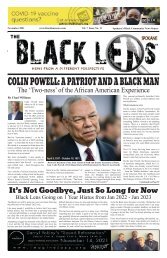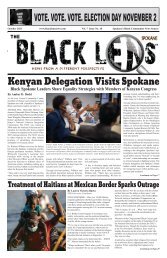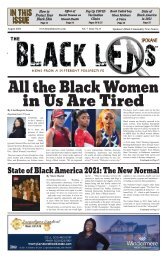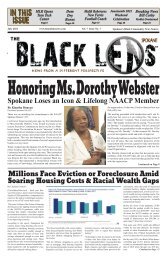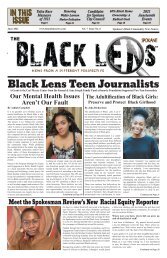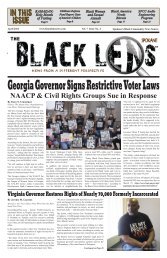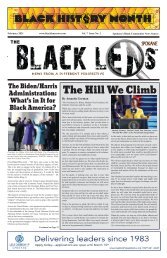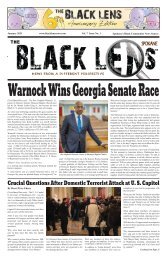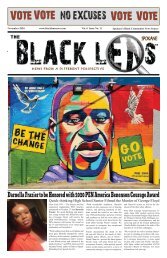Black Lens - September 2021
The Black Lens is an independent community newspaper published monthly that is based in Spokane, WA. It covers the news, issues, people and events that are of importance to the Black community.
The Black Lens is an independent community newspaper published monthly that is based in Spokane, WA. It covers the news, issues, people and events that are of importance to the Black community.
You also want an ePaper? Increase the reach of your titles
YUMPU automatically turns print PDFs into web optimized ePapers that Google loves.
The <strong>Black</strong> <strong>Lens</strong> Spokane<br />
www.blacklensnews.com <strong>September</strong> <strong>2021</strong><br />
Page 23<br />
The Impact of COVID-19 on Our Children’s Education<br />
By Dr. Jeanne Aston Baynes<br />
While <strong>Black</strong> Americans are working essential<br />
jobs to support the U.S. during the<br />
COVID-19 pandemic, many factors will<br />
continue to contribute to the inequity of<br />
education for African Americans. Stress<br />
due to the existence of COVID-19, including<br />
the worry of contracting the virus, loss<br />
of jobs and income, stress of family members<br />
contracting the virus, and grief from<br />
losing family members can tax mental capacity<br />
and cognitive functioning. African<br />
Americans disproportionately represented<br />
during COVID-19 will also bear the brunt<br />
of these stress reactions, which will inevitably<br />
impact their ability to teach their<br />
children. Studies have shown the relationship<br />
between stress and cognitive function.<br />
Even when controlling for factors such as<br />
age, education, and depressive symptoms,<br />
increased stress impacted cognitive performance.<br />
As many schools transitioned to virtual<br />
learning in 2020, many home environments<br />
were not prepared or able to provide<br />
a comparable learning environment<br />
for children. Even if a parent could stay<br />
home and assist in educating their children<br />
during the pandemic, there were necessary<br />
items for its success. Only 66% of <strong>Black</strong><br />
households in the U.S. had home broadband<br />
service in 2019. Only 45% of <strong>Black</strong><br />
Americans owned a desktop or laptop<br />
computer in 2015. Without access to the<br />
internet or a computer, <strong>Black</strong> parents are at<br />
a disadvantage in educating their children.<br />
Along with the possible decline in progress<br />
for vulnerable students from moving<br />
to an online format, it is also essential to<br />
consider the summer break that just ended.<br />
Research shows vulnerable populations<br />
are susceptible to losing academic gains,<br />
(summer slide) over the summer. Additionally,<br />
students who do not have access to<br />
continued learning over the summer are at<br />
risk of maintaining the achievement gaps.<br />
The schools in Spokane County provided<br />
laptops to students. However, many did not<br />
have access to the internet. Organizations<br />
in the community provided hot spots for<br />
families so that they access the internet,<br />
but many had fallen behind in their assignments.<br />
Communities should be concerned about<br />
the negative consequences this period of<br />
stay-at-home orders related to COVID-19<br />
has had on children’s educational attainment.<br />
Schools can expect higher levels<br />
Photo: Shutterstock<br />
of <strong>Black</strong> children represented in special<br />
education when schools reopen in the<br />
fall. More <strong>Black</strong> children will be likely to<br />
receive lower test scores than their sameaged<br />
White peers upon return to in-person<br />
learning. The importance of considering<br />
the timing of learning disability evaluations<br />
is high.<br />
African American students are at critical<br />
risk for overidentification in the special education<br />
system. The coronavirus pandemic<br />
has highlighted and could increase these<br />
risks for our students. Through addressing<br />
the systemic inequities that result in the<br />
overidentification, the achievement gap<br />
can lessen.<br />
As we look forward to the fall and a<br />
new school year<br />
Although the 2020–21 academic year ended<br />
on a higher note—with rising vaccination<br />
rates, outdoor in-person graduations,<br />
and access to at least some in-person learning<br />
for 98 percent of students—it was as a<br />
whole perhaps one of the most challenging<br />
for educators and students in our nation’s<br />
history.1 And the crisis had an impact<br />
on not just academics but also the broader<br />
health and well-being of students, with<br />
more than 35 percent of parents very or<br />
extremely concerned about their children’s<br />
mental health.<br />
Although it is too early to fully assess the<br />
effectiveness of postpandemic solutions to<br />
unfinished learning, the scope of action is<br />
already clear. The immediate imperative is<br />
to not only reopen schools and recover unfinished<br />
learning but also reimagine education<br />
systems for the long term. Across all<br />
of these priorities it will be critical to take a<br />
holistic approach, listening to students and<br />
parents and designing programs that meet<br />
academic and nonacademic needs alike.<br />
While all types of students experiencing<br />
unfinished learning, some groups were<br />
disproportionately affected. Students of<br />
color and low-income students suffered<br />
most. Students in majority-<strong>Black</strong> schools<br />
ended the school year six months behind<br />
in both math and reading, while students in<br />
majority-white schools ended up just four<br />
months behind in math and three months<br />
behind in reading.8 Students in predominantly<br />
low-income schools and in urban locations<br />
also lost more learning during the<br />
pandemic than their peers in high-income<br />
rural and suburban schools.<br />
In reading articles about the reports from<br />
parents, many reported increases in clinical<br />
mental health conditions among their children,<br />
with a five-percentage-point increase<br />
in anxiety and a six-percentage-point increase<br />
in depression. They also reported<br />
increase in behaviors such as social withdrawal,<br />
self-isolation, lethargy, and irrational<br />
fears.<br />
Even if students re-enroll in effective learning<br />
environments in the fall, many will still<br />
be several months behind academically and<br />
may struggle to reintegrate into a traditional<br />
learning environment. Some school districts<br />
are creating strategies to support students<br />
as they work to make up unfinished<br />
learning and as they work through mental<br />
health issues and social reintegration.<br />
However, many students are still far behind<br />
where they need to be, especially those<br />
from historically marginalized groups. Left<br />
unchecked, unfinished learning could have<br />
severe consequences for students’ opportunities<br />
and prospects. In the long term, it<br />
could exact a heavy toll on the economy.<br />
Districts and states now have the opportunity<br />
to spend that money effectively to support<br />
our nation’s students.<br />
I agree that schools need to reopen for in<br />
person learning, reengaging students into<br />
effective learning environments, support<br />
students in recovering unfinished learning<br />
and broader needs, recommit and reimagine<br />
our education systems for long term.<br />
In addition, year around schools are an option<br />
and should be considered or possibly<br />
lengthening the school year.<br />
Commitment to our Students<br />
During this past year, I worked as a mentor<br />
to high school students encouraging and<br />
supporting them in their quest to complete<br />
a successful year. In building relationships,<br />
I made personal contacts through<br />
conversations with them and their parents,<br />
and meeting them at their respective high<br />
school. Stressing that remote learning is<br />
temporary but their education would ensure<br />
that they have the tools needed to survive,<br />
get a job, learn how to work and be productive.<br />
Education has been an essential part<br />
of every society and it was important to<br />
strive for it. Furthermore, there were community<br />
members such as Pastor Shon Davis,<br />
William Davis, and others who served<br />
as mentors encouraging students to stay<br />
on task, seek out resources and complete<br />
as many assignments as they could. Some<br />
received food and school supplies. Quite a<br />
few were students of color. As members of<br />
the Spokane Community, it is our mission<br />
to support our students.<br />
Resources:<br />
Hough, Heather J, “Covid-19, the Educational<br />
Equity Crisis, and the Opportunity Ahead.<br />
Brookings Institution, April 29, <strong>2021</strong>.<br />
Dorn, Emma, et. al., “COVID-19 and Education:<br />
The Lingering Effects of Unfinished<br />
Learning: By Dorn, Emma, et. al <strong>2021</strong>. McKinsey<br />
and Company, July <strong>2021</strong>.<br />
35 W. Main, Suite 250, Spokane, WA 99201<br />
Tel: 509-325-2665 • Fax: 866-376-6308<br />
Federal and State laws prohibit housing<br />
discrimination based on:<br />
Race ○ Color ○ Religion ○ Gender ○<br />
Disability ○ National Origin ○<br />
Familial Status ○ Marital Status ○<br />
Sexual Orientation ○ Military / Veteran Status ○<br />
Citizenship or Immigration status<br />
Services offered:<br />
Fair housing counseling, advocacy & education<br />
The work that provided the basis for this publication was supported in part by funding under a grant with the U.S.<br />
Department of Housing and Urban Development, HUD. NWFHA is solely responsible for the accuracy of the statements<br />
and interpretations contained in this publication.<br />
GRANTS FOR<br />
SPOKANE ARTISTS<br />
AND ARTS PROGRAMMING<br />
Requests up to $10,000<br />
WHAT<br />
WH0<br />
WHen<br />
Grants for performance, literary, musical, craft, traditional,<br />
visual arts, educational programming, and more!<br />
Individuals, non-profits, + businesses for operational costs,<br />
projects, and programs can apply.<br />
Applications are due FEBRUARY 1, JUNE 1, and OCTOBER 1<br />
every year.<br />
APPLY NOW!<br />
www.spokanearts.org/grants





